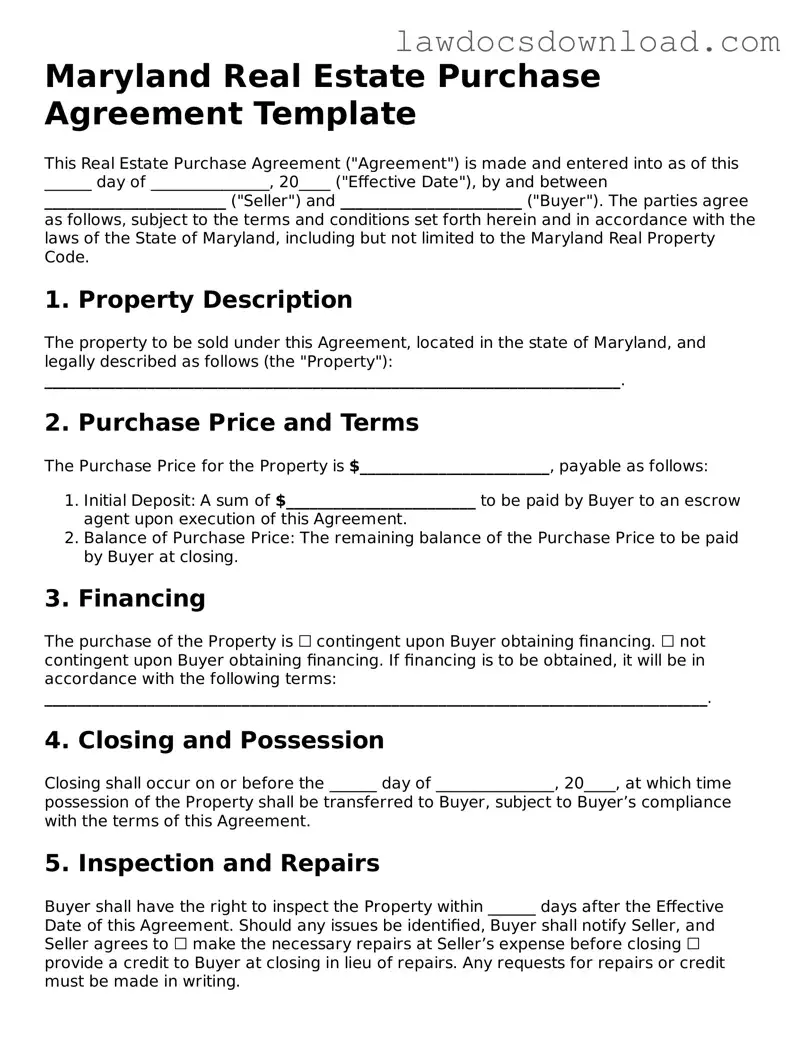Maryland Real Estate Purchase Agreement Template
This Real Estate Purchase Agreement ("Agreement") is made and entered into as of this ______ day of _______________, 20____ ("Effective Date"), by and between _______________________ ("Seller") and _______________________ ("Buyer"). The parties agree as follows, subject to the terms and conditions set forth herein and in accordance with the laws of the State of Maryland, including but not limited to the Maryland Real Property Code.
1. Property Description
The property to be sold under this Agreement, located in the state of Maryland, and legally described as follows (the "Property"): _________________________________________________________________________.
2. Purchase Price and Terms
The Purchase Price for the Property is $________________________, payable as follows:
- Initial Deposit: A sum of $________________________ to be paid by Buyer to an escrow agent upon execution of this Agreement.
- Balance of Purchase Price: The remaining balance of the Purchase Price to be paid by Buyer at closing.
3. Financing
The purchase of the Property is ☐ contingent upon Buyer obtaining financing. ☐ not contingent upon Buyer obtaining financing. If financing is to be obtained, it will be in accordance with the following terms: ____________________________________________________________________________________.
4. Closing and Possession
Closing shall occur on or before the ______ day of _______________, 20____, at which time possession of the Property shall be transferred to Buyer, subject to Buyer’s compliance with the terms of this Agreement.
5. Inspection and Repairs
Buyer shall have the right to inspect the Property within ______ days after the Effective Date of this Agreement. Should any issues be identified, Buyer shall notify Seller, and Seller agrees to ☐ make the necessary repairs at Seller’s expense before closing ☐ provide a credit to Buyer at closing in lieu of repairs. Any requests for repairs or credit must be made in writing.
6. Title and Title Insurance
Seller agrees to provide Buyer with a good and marketable title to the Property, free and clear of all encumbrances, by providing a Title Insurance Policy issued by a company licensed to do business in Maryland. The cost of the Owner’s Title Insurance Policy shall be paid by ☐ Seller ☐ Buyer.
7. Closing Costs
Unless otherwise agreed upon in writing, closing costs shall be allocated as follows:
- Buyer is responsible for: Financing costs, appraisal fees, and Buyer’s attorney fees.
- Seller is responsible for: State transfer tax, deed preparation cost, and Seller’s attorney fees.
8. Notices
All notices or other communications required or permitted by this Agreement shall be in writing and delivered to the parties at the following addresses:
Seller: ________________________________________________________________
Buyer: ________________________________________________________________
9. Governing Law
This Agreement shall be governed by and construed in accordance with the laws of the State of Maryland, without giving effect to any choice or conflict of law provision or rule.
10. Entire Agreement
This Agreement constitutes the entire agreement between the parties pertaining to the subject matter hereof and supersedes all prior agreements, understandings, negotiations, and discussions, whether oral or written, of the parties. Any amendments to this Agreement must be in writing and signed by both parties.
IN WITNESS WHEREOF, the parties have executed this Agreement as of the first date written above.
Seller's Signature: _________________________________________________________
Buyer's Signature: __________________________________________________________

